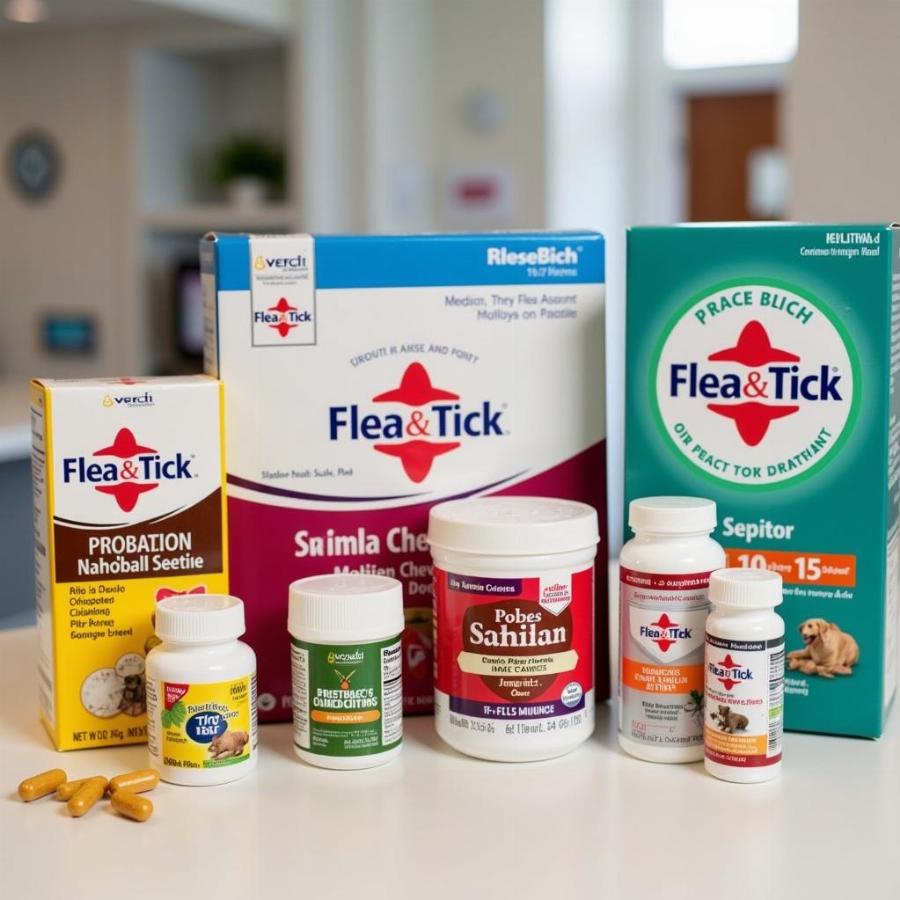Protecting your beloved canine companion from parasites is a crucial aspect of responsible pet ownership. Flea and tick infestations can cause intense itching, skin irritation, and even transmit diseases. Heartworm, a potentially fatal parasite spread by mosquitoes, poses a serious threat to your dog’s health. This comprehensive guide explores everything you need to know about flea, tick, and heartworm prevention, empowering you to make the best decisions for your furry friend.
Understanding the Threats: Fleas, Ticks, and Heartworms
Fleas are tiny, wingless insects that thrive on the blood of mammals. They reproduce rapidly and can quickly infest your home and yard. Ticks, larger than fleas, are arachnids that also feed on blood. They can transmit a range of diseases, including Lyme disease and Rocky Mountain spotted fever. Heartworm, unlike fleas and ticks, is a parasitic worm that lives in the heart and lungs of dogs. Mosquitoes transmit heartworm larvae, which can mature into adult worms and cause severe health problems, even death.
 Choosing the Right Flea and Tick Killer for Your Dog
Choosing the Right Flea and Tick Killer for Your Dog
Choosing the Right Flea and Tick and Heartworm Pill for Dogs
With so many flea, tick, and heartworm preventatives on the market, choosing the right one can feel overwhelming. Some common options include oral medications (pills and chewables), topical treatments, and collars. Oral medications are generally easy to administer and offer broad-spectrum protection. Topical treatments are applied directly to your dog’s skin and can be effective against fleas and ticks. Collars provide continuous protection, but may not be suitable for all dogs. Consulting with your veterinarian is essential to determine the most appropriate product based on your dog’s age, breed, lifestyle, and health status.
Considering Your Dog’s Specific Needs
Factors such as your dog’s size, age, and any underlying health conditions play a vital role in selecting the appropriate preventative. Puppies and senior dogs may have different sensitivities, requiring specific formulations. Similarly, dogs with certain medical conditions may need a tailored approach. Your veterinarian can guide you toward the safest and most effective options for your dog’s unique needs.
Administering Flea, Tick, and Heartworm Medication
Following the instructions provided by your veterinarian and the product label is crucial for ensuring the medication’s effectiveness and your dog’s safety. For oral medications, ensure your dog swallows the pill or chewable completely. For topical treatments, apply the product to the skin on the back of the dog’s neck, where they cannot lick it off. If using a collar, ensure it fits snugly but not too tight.
Ensuring Proper Dosage and Frequency
The correct dosage and frequency of administration are essential for optimal protection. Always follow your veterinarian’s instructions and the product label guidelines. Never give your dog more than the recommended dose, as this can be harmful. Maintain a consistent schedule to prevent gaps in protection.
Frequently Asked Questions (FAQ)
-
How often should I give my dog flea and tick and heartworm prevention? Most preventatives are administered monthly, but some may have different schedules. Consult your veterinarian for specific recommendations.
-
Can I use over-the-counter flea and tick products? While over-the-counter options are available, it’s always best to consult your veterinarian before using any product on your dog.
-
What are the signs of heartworm disease in dogs? Signs can include coughing, fatigue, difficulty breathing, and weight loss. If you notice any of these symptoms, contact your veterinarian immediately. flea and heartworm tablets for dogs
-
Are there any natural remedies for fleas and ticks? While some natural remedies exist, their effectiveness varies. Discuss any natural approaches with your veterinarian before using them on your dog.
-
How can I prevent mosquito bites on my dog? Keeping your dog indoors during peak mosquito hours and using mosquito repellents (approved for dogs) can help reduce the risk of heartworm transmission. anti parasite for dogs
-
What should I do if my dog has a reaction to flea, tick, or heartworm medication? Contact your veterinarian immediately if you notice any adverse reactions, such as vomiting, diarrhea, or skin irritation.
-
Are flea, tick, and heartworm preventatives safe for pregnant or lactating dogs? Some preventatives may not be safe for pregnant or lactating dogs. Consult your veterinarian to determine the safest option. pills for fleas for dogs
Conclusion
Protecting your dog from fleas, ticks, and heartworm is a vital part of responsible pet ownership. By understanding the risks and choosing the right preventative, you can safeguard your furry friend’s health and well-being. Consult your veterinarian for personalized advice and create a comprehensive parasite prevention plan to ensure your dog lives a long, happy, and healthy life. simparica trio 22.1-44 lbs. dogs
Beaut Dogs is your trusted source for expert advice on all things dog-related. We provide a wealth of information on dog breeds, care, and well-being. For personalized guidance on flea, tick, and heartworm prevention for your beloved canine, contact us at Email: [email protected]. Beaut Dogs is committed to helping you provide the best possible care for your furry friend. Visit https://beautdogs.com to learn more!